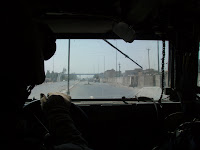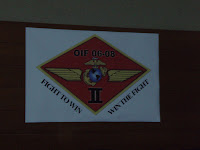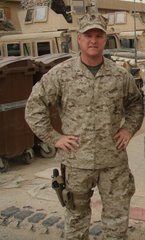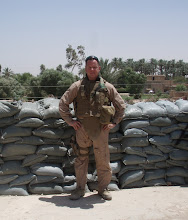
I have still been in contact with Col Visconage in Baghdad since my return. We have traded email on various topics and I asked him about his latest collection missions and he agreed to be a guest blogger on the below submission.
Supplying the War
On the road last night, and into the morning riding on a Combat
Logistics Patrol (CLP). I rode with 2nd Platoon, 755th Chemical Company
of the Nebraska National Guard. They are part of the 734th
Transportation Battalion, a National Guard Battalion out of South
Dakota.
The Battalion CO is normally a high school history teacher. Earlier in
the tour he was able to link up with three former students assigned to
other Army units in Iraq. The Battalion is a composite organization,
two companies are active duty, and three are National Guard or Army
reserve. They've been converted from a chemical company into a security
company-a part of the ongoing convoy effort that puts 2,000-3,000
vehicles on the road every night in order to provide the logistics
support for the war.
The Company has just suffered a casualty last night in another platoon;
a solider was killed when an IED explosion on the road north hit his
HMMWV. This was the second KIA for the company, as they had suffered
another IED loss a few months ago. Most of the company leadership has
just come from the runway at this airbase for a "ramp ceremony" which
loaded the soldier's body for the trip home. As the company commander,
Captain David Benak, explained, with a National Guard unit most of the
soldiers have known each other for a long time. They live in the same
neighborhoods, a lot of them socialize with each other in their civilian
lives, and many of their kids go to school together. It makes the loss
all the more personal. Few details are know about last night's
explosion, but they details will be provided if there is any
intelligence information to be gathered that will help the others learn
the enemy's latest IED methods.
The 755th is manned by citizen-soldiers. Their array of backgrounds
includes a physical therapist, a student, a grain silo manager, a
hardware store employee, etc. The platoon commander for second platoon
is the local televisions weather man, Chuck McWilliams. A first
lieutenant, he previously served on active duty in the Navy before
getting out and going to college. Second Platoon has 42 soldiers in it.
About half well be on tonight's mission.
I was assigned to the Armored Security Vehicle (ASV) that would be
callsign "Gun 3" for the convoy. The section would escort 30 Third
Country Nationals (TCN) vehicles; tractor-trailers with various unknown
loads. After staging at the Company motor pool, we sat in on the formal
convoy brief for this patrol-the route, immediate action drills,
communications, etc. The soldiers know the brief by heart. Most have
stopped counting the number of CLPs they have been on since they arrived
last October. The number is probably somewhere between 50 and 100.
They also know the routes since there are really only so many ways to go
from point A to point B. More importantly, they know which sections of
each route are the most likely for encountering IED's or small arms
fire.
From there we moved to the TCN vehicle staging point on the other side
of the base, about a ten-minute drive. The gunner, SPC Mohr (the
physical therapist and former active duty USAF airman), let me sit
(stand actually) in the turret for the drive over. It was like the fun
a dog has sticking his head out the car window on a road trip. At the
TCN lot is was another hour waiting our turn for the specific convoy of
vehicles we would be taking. There are many, many trucks lined up, and
many, many convoys heading out tonight, just like any night. It's the
quintessential hurry up and wait situation, only this with a dance of
hundreds of semi trucks interspersed with security vehicles waiting
their turn to be cleared to exit the base on their runs. After the
convoy is linked-up, we stack up along the road inside the gate for the
final go-ahead.
There are two classes of convoys; the first category is made up of those
trucks directly driven by KBR, the main contractor for overland
transport, whose trucks are driven by Americans or other English
speakers. Most of these men (and women) came over lured by the money
but also because they see themselves as part of the war effort. One
50-year-old female driver who goes by "Fred" said she came here four
years ago initially, "to get out of debt." She did that after a year,
but stayed on. Another driver from, Houston, TX, said he had been here
three years. It seems to be more than the money for them at this point;
they see themselves as part of the war effort and they like being around
the soldiers. Some have family in the military. One has a son who had
already served here. One supervisor, the KBR convoy commander (or "C2")
for his group of trucks, told me about his son who wants to go the Naval
Academy.
The other category of vehicles and drivers are the TCN's, a mix of
drivers from any number of different countries (Turkey, Pakistan, India,
Bangladesh, and the Philippines, to name a few). Almost none speak
English, and this makes the escort duty more tenuous if there is an
emergency. They are not as quick to respond to direction or to
understand the drills. Their vehicles are also less protected and may
have not been well-maintained. Having a vehicle stop because on
mechanical breakdown causes and added level of danger. Most of the
TCN's are here for the money they can make. It's more than most will
see in years at a job in their own countries. According to the KBR
drivers, the few that do speak English are often well-educated
professionals, but even they can make more money here than at home.
One of our vehicles gets dropped out of the mix as we headed toward the
exit gate; the driver was having some kind of personal problem
(dizzy/disoriented) and is lagging behind in the convoy. They send him
back to the staging lot. Finally, we're "outside the wire" by about
2230, with two other convoys heading in the same direction.
Early on, SPC Mohr gives me another chance in the turret. The gunner's
job is to constantly scan either side of the road with the night sight
for signs of any unusual activity, while also keeping an eye on the
interval between the truck in front and the truck behind. The ASV
turret is set up for both a .50 caliber machine gun and a Mk 19 40mm
grenade launcher, so there's plenty of fire power if needed. After
about 10-minutes in the turret, it's time to turn it back over to the
real gunner. It's cramped inside. The vehicle is made for four at
most--they usually only need three. The vehicle commander, SGT Haverty,
and the driver, SPC Turnbull, are up front with a least a little view of
the road through the reinforced windows. My seat is in the back since
I'm not mission essential. If you're claustrophobic, this is not the
ride for you. The visibility is limited to a few slits with blast-proof
glass out the sides of the vehicle. I can inch my way around on a few
occasions to try to get a better view of things over the driver's
shoulder, but it's cramped. This probably wouldn't be as bad, but we're
all wearing our personal protective gear (flak jacket, helmet, etc.).
The crews like the ASV, with the exception of the difficulty getting out
in case of explosion or fire. For the larger soldiers, it's almost
impossible to exit from the emergency hatches with your gear on. This
is made worse in the panic of an attack, at night, or a vehicle
roll-over. They do have me hooked up with a headset for the internal
communications system (ICS) so I can listen to their conversation and
the radio communication with the rest of the convoy.
The road varies in width and quality. Some stretches are simple
two-lane country roads, while other sections are 6-lane divided
highways. There's a certain amount of stop and go in the trip as we
come to intersections and check points. There are not a lot of civilian
vehicles on the road at night. Most of the route is semi-rural. There
are homes and occasionally more built-up groups of shops or buildings.
At about 2330 we slow down behind the convoy ahead of us, with another
convoy nose-to-tail behind. The radio chatter starts to pick up and it
becomes apparent that the convoy ahead is taking small arms fire.
Flares go up to the left. We can see the tracers from a friendly
vehicle returning fire into the brush off to the left and right about
100 meters ahead.
We hold our position for at least another 20 minutes and slowly begin
creeping forward. It's confusing, but the engagement seems to have been
brief and inconclusive. We pass a TCN truck on our right from the first
convoy. They hood is up, but it's hard to tell if what the damage is.
Initially there's no sign of the driver, but he soon turns up. The
radio conversation reports that his foot is bleeding and someone from
another convoy will bandage him up and take him to the next aide
station. Even though they are not from our convoy, we take charge of
escorting two TCN trucks that must be towed; they'll be dropped at
another base that is along our route of travel. Traffic starts to roll
and again and we are at the gate for the drop off by about 0030. It
takes almost two hours to get the vehicles dropped off inside the base.
Only the escort vehicle takes the two disabled trucks to a staging area
inside the base. We wait in our vehicles with the convoy. Finally at
0230 we continue on, headed towards our final destination.
The final stretch traces through the edge of Baghdad. Many more
buildings and houses. There are various streetlights and porch lights
that provide some illumination of the area. Finally, we're at the gate.
Weapons are cleared and electronic counter-measures are turned off.
It's 0345. The TCN trucks route into a separate area to be screened
one-by-one for contraband or explosive devices before they actually on
base. They will eventually be routed to their final destination on base
by other elements. The platoon won't be able to return tonight-not
enough hours of darkness remain. They'll bed down in transient quarters
and try to get some sleep before picking up another convoy tonight for
the run back home.
In October they'll pack up and head home to Nebraska. Some back to
jobs, other to school, a few will volunteer to come back with other
units. Most have remained motivated about their mission here, but are
concerned about the frequency of future mobilizations and the impact
that has on their civilian plans and professions. Maybe half will stay
in the National Guard when their commitments are up.























